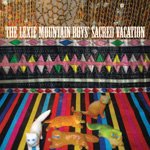Forget art culture, subculture, counterculture, or anti-culture; there’s something innately tribal in Lexie Mountain Boys. Could it be the way that the now-heralded, Baltimore-based art troupe fits and chants ritualistically? Or could it be that their camaraderie hints at actual kinship: washes of laughter, each stomp, each clap finding an echo, each call mustering a response, a harmony. The music conjured by the group, created with little more than their voices and appendages, spans a vast aural range: atonal to melodic, sparse to cluttered, solemn to hilarious, screams to utterances. They rouse moments that feel as alienating as sacred rites and others that extend their fingers and invite.
Recorded live and without any sort of manipulation by fellow Baltimore resident (and one half of Wye Oak) Andy Stack, Sacred Vacation is the sonic complement to Lexie Mountain Boys’ eye-popping and, at times, shocking live performances. These performances have found the group donning, among other things, beards, Southern Belle dresses, shrubbery, and an enormous, audience-encompassing dress. Though clearly choreographed on some level, the group also demonstrates loose abandon as their chants, rhythms, stage jaunts, and collisions seemingly crash into their performances from nowhere.
Throughout Sacred Vacation there is this prevailing sense of conjuring that’s balanced in equal parts by destruction and genuine fun. Take “Low Tide Sirens Say,” which enters with an insistent flurry of claps and stomping. This assault of rhythm soon disintegrates into a slow-mounting chant, joined later by a melody of lip-twittering. Just as the chant seems to climax, it ends abruptly, yielding to a series of unintelligible utterances and then a chorus of cat-in-heat moaning. “Catcall” follows a similar arc, featuring the faux-cheer “You got a husband/ You got a boyfriend,” which melts into the band tossing accusations of commitment at each other that ultimately decay into laughter.
As satisfying and intriguing as the pieces that compose Sacred Vacation are, it inevitably feels incomplete without their accompanying live performances. Often, the tracks play like an ethnography audio tape: a collection of sounds that relate to something too esoteric or nebulous or beautiful to imagine. Oddly, the successes of Sacred Vacation lie in the same notion – that the intrigue and celebration embedded in these recordings will undoubtedly lead the listener to a Lexie Mountain Boy stage.
More about: Lexie Mountain Boys

